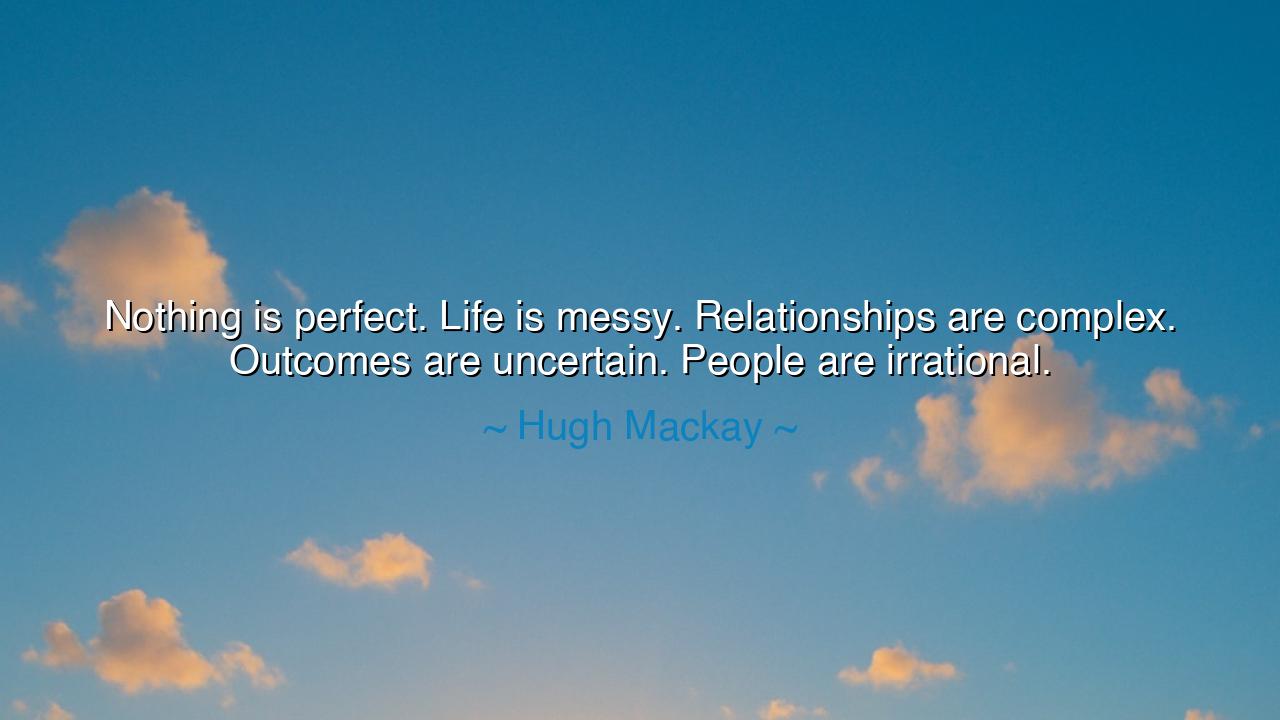
Nothing is perfect. Life is messy. Relationships are complex.
Nothing is perfect. Life is messy. Relationships are complex. Outcomes are uncertain. People are irrational.






Hear, O child of wisdom, the sober counsel of Hugh Mackay: “Nothing is perfect. Life is messy. Relationships are complex. Outcomes are uncertain. People are irrational.” These words are not meant to break the spirit, but to free it. They remind us that the world is not a smooth road paved by certainty, but a wilderness full of turns and shadows, where the traveler must learn to walk with humility, patience, and courage.
Consider first the truth that nothing is perfect. This is a truth as old as the mountains. The rose is beautiful, but its petals fall. The harvest is abundant, yet never free from weeds. No human plan, no matter how noble, unfolds without flaw. To seek perfection is to chase the horizon: noble in intention, yet impossible to grasp. It is not perfection that gives life meaning, but the striving, the effort, the journey.
And behold: life is messy. Rivers overflow their banks, storms destroy what men build, and the order of one day dissolves into the chaos of the next. Yet within this mess lies creation. The painter’s studio is cluttered, but from that chaos springs beauty. The soil is muddy, yet from it grow the vines and the grain. To despise the mess is to despise life itself, for it is out of mess that meaning and creation arise.
Think also of the heart: relationships are complex. Between mother and child, between friends, between lovers and families, bonds are woven not of simple threads, but of tangled cords of loyalty, love, jealousy, sacrifice, and misunderstanding. History bears witness to this truth. Recall the tale of Marcus Aurelius and his son Commodus: the wise emperor, philosopher, and stoic sought to raise a noble heir, yet his son’s folly and cruelty shattered that hope. Their relationship was a storm of love, duty, and betrayal. Such is the complexity of human ties—never pure, never simple, yet still real, still binding.
Furthermore, outcomes are uncertain. No general enters battle knowing the end. No farmer sows seeds with full assurance of harvest. No dreamer begins a great work with certainty of success. When Columbus sailed westward, he did not know whether he would find a new world or perish in endless seas. The uncertainty of outcomes is the forge in which courage is tested. To demand certainty before acting is to remain forever idle.
Lastly, remember this: people are irrational. They love against reason, they fear without cause, they hope in the face of despair. And yet, this very irrationality is what makes humanity glorious. It is irrational to sacrifice for a stranger, to forgive an enemy, to risk all for a dream—but these are the very acts that ennoble the soul. Reason alone builds machines; the strange, irrational heart builds civilizations of love and beauty.
What lesson, then, shall you take? Embrace imperfection. Accept the mess of life. Be patient with the complexity of relationships. Act boldly despite uncertainty. Love people even when they make no sense. Do not seek to iron out the wrinkles of existence; rather, learn to walk with them, to find grace in their folds. For wisdom is not in conquering life’s chaos, but in learning to dance with it.
Therefore, O seeker, let these truths guide you: life will never be perfect, nor simple, nor certain—but it is yours to live richly, courageously, and with compassion. Do not waste your days chasing the illusion of flawlessness. Instead, cherish the beauty of imperfection, the lessons of uncertainty, and the strange wonder of human hearts. In this, you will find peace deeper than perfection and joy brighter than certainty.






AAdministratorAdministrator
Welcome, honored guests. Please leave a comment, we will respond soon